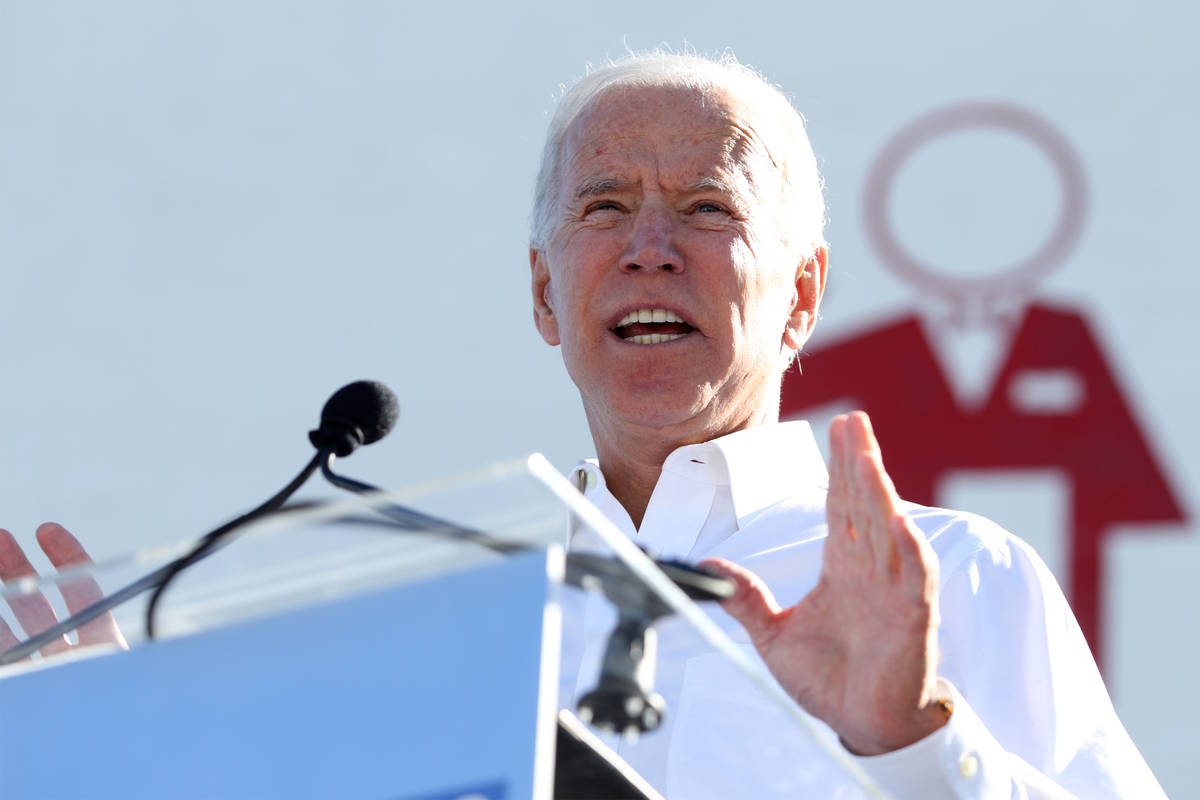Biden plan could mean 83K jobs in Silver State, researcher says
More than 80,000 child care and prekindergarten jobs could be created in Nevada if President Joe Biden’s $1.8 trillion American Families Plan comes to fruition, new research indicates.
Biden, during a Wednesday night address to a joint session of Congress, laid out the massive package that promises to provide new spending on child care, education and families over the next 10 years.
The American Families Plan, if passed and signed into law, would expand preschool and college opportunities, create a national family and medical leave program, distribute child care subsidies and make other similar investments.
Proponents of Biden’s plan said that beyond improving the lives of children and families, the proposal will bring women back into the workforce while creating new jobs.
In the child care industry, it could mean tens of thousands of new jobs in the Silver State. New research from Women Effect Fund and University of Massachusetts, Amherst economist Lenore Palladino found that it would create more than 83,000 new child care and prekindergarten jobs in Nevada.
The model uses data from input-output tables produced by the Bureau of Economic Analysis. Palladino said she was able to allocate among the states based on the ratio that each state received in the American Rescue Plan — which was signed into law last month — as part of her calculus.
“And then what we do is see what the impacts will be from that additional funds available in Nevada for child care,” Palladino said. “We see both the creation of new child care jobs and the increase in employment that results from those child care workers spending money on goods and services in the economy.”
Child care big cost to families
Child care costs are not cheap: The price of infant child care at a center costs more than $12,000 a year in Nevada, according to advocacy group Child Care Aware of America, exceeding the average in-state tuition at public colleges. The group found that a married couple in Nevada with two children would spend 25 percent of income for annual, full-time attendance at a care center.
“Across the board, families, especially when they’re raising young children, they’re at the earlier stages of their income potential,” said Lisa Guide, co-founder of the Women Effect Fund and associate director of the Rockefeller Family Fund. “In many cases, people are paying more than they’ll end up paying for those same kids to go to college. It’s just completely unaffordable, out of reach for so many families.”
Biden’s plan would work on a sliding scale based on a household’s income. A fact sheet from the White House said that for the most hard-pressed working families, child care costs for their children would be fully covered and families earning 1.5 times their state median income would pay no more than 7 percent of their income, saving the average family an estimated $14,800 per year on expenses.
The plan also calls for $200 billion to be allocated for a universal prekindergarten program for all 3- and 4-year-olds, which could save families even more.
Guide said Biden’s plan is needed now more than ever as the economy reopens.
The lack of affordable child care options in the U.S. was exacerbated by the COVID-19 pandemic and economic downturn, she said. Many working parents, especially women, have juggled raising their children while working.
Guide and Palladino, using labor data, found that female workers in Nevada’s workforce dropped by 7.8 percent last year. The American Families Plan, they said, would reverse economic damages of the pandemic.
“A disproportionate number of women nationally, millions of women, have had to leave the labor force because of the crisis in care,” Guide said. “The pandemic has exacerbated an existing fragility in our economy — we do not have a well-developed care system to ensure that parents, especially women, have good, solid, affordable options. This proposal is important for working women to move into the next stage of prosperity.”
Tiffany Tyler-Garner, executive director of Children’s Advocacy Alliance and former head of Nevada’s workforce agency, said Biden’s plan is essential for an economic recovery.
“This investment is critical to our economic recovery and the child care industry’s recovery,” Tyler-Garner said. “Without affordable quality child care, many families will not be able to return to work. Moreover, it is important to note that this issue disproportionately (impacts) women who left the workforce at four times the rate of men during the pandemic.”
GOP opposition, counterproposal
Not everyone is enamored with the proposal.
Sen. Tim Scott, a South Carolina Republican, who delivered the GOP’s response to Biden’s address, rejected the American Family Plan.
“Even more taxing, even more spending, to put Washington even more in the middle of your life — from the cradle to college,” Scott said during his GOP response. “The beauty of the American Dream is that families get to define it for themselves. We should be expanding options and opportunities for all families — not throwing money at certain issues because Democrats think they know best.”
Rep. Mark Amodei, the Republican from Nevada’s congressional delegation, said he is taking a wait-and-see approach. He said he wants to see the full text of Biden’s proposal before making a decision, but he already has some questions.
“We’ve had a heck of a lot of real-fast movement in the last 90 days,” he told the Review-Journal in a phone interview Monday. “We’ve been doing a lot of fast-talking about some large platitudes, and ‘Hey this is going to be great for kids because they get to go to school earlier, it’s going to help with child care and all that.’”
Amodei said he wants more context from the Biden administration. “Tell me what your curriculum is. Is the federal government going to become now the super school district?” he said.
There are a lot of unanswered questions, Amodei said, about how community colleges and pre-K curriculum will work. “Education has become a lightning rod in terms of policy and politics.”
“It’s hard to say when you don’t have anything in a bill that says, here’s how we’re going to fund it,” Amodei said.
Senate Minority Leader Mitch McConnell said Monday he wouldn’t support Biden’s $4 trillion infrastructure proposals, the $2.3 trillion American Jobs Plan and $1.8 trillion American Families Plan.
“I think it’s worth talking about, but I don’t think there will be any Republican support — none, zero — for the $4.1 trillion grab bag, which has infrastructure in it but a whole lot of other stuff,” he said Monday. “I think I can pretty safely say none of my Republican colleagues are going to support a $4.1 trillion infrastructure package, only part of which is for infrastructure.”
Utah Republican Sen. Mitt Romney told Capitol Hill reporters last week that Biden’s proposal isn’t the best option to help families.
In February, Romney offered his Family Security Act, a cash payment program that would give directly to families: a monthly cash benefit of $350 for each young child and $250 a month for each school-age child.
“I’d rather give the money we’re currently providing to families, give it to them in a monthly check and allow them to decide how to spend their money to help their child,” Romney told reporters last week, according to Business Insider. “Building a national child-care enterprise of some kind, run by the federal government, is not my idea of the best way to give families the options that they would like to have.”
Democrats behind president
Meghin Delaney, a spokeswoman for Gov. Steve Sisolak, said the governor is “encouraged” by Biden’s American Families Plan “as a way to help continue the nation and the State’s economic recovery efforts and help us all build back better.”
Biden’s plan would align with Sioslak’s recently announced “Every Nevadan Recovery Framework,” a state-specific plan for the expenditure of federal funds to address the effects of the pandemic. “Many of the priorities laid out within the State’s framework fit in with the proposals in the American Families Plan,” added Delaney.
Rep. Steven Horsford said he strongly supports Biden’s plan, calling it “a once-in-a-generation investment that will repair the damage of COVID-19 and create a brighter future for every Nevada family.”
“With better options for child care, more Nevada women will be able to remain in the workforce, boosting the welfare of their families and the overall economy,” added Horsford.
Rep. Dina Titus said the investments in education proposed in Biden’s American Families Plan will help bring disadvantaged families into the middle class. “It would make the American Dream a reality for more Southern Nevadans,” she said.
Titus said that the plan would “make life easier for parents and set children up for success,” adding that there is consensus that children who have access to early childhood education become more successful students later in life.
“The earlier they start, the better they do, the longer they stay, and the more successful they are,” said Titus. “Additionally, parents who send their children to preschool have far more flexibility to pursue their own careers. Throughout this past year, we have seen that when children don’t go to school, parents and especially mothers get pushed out of the workforce.”
Tax credits key to Biden’s plan
Policymakers said the president’s proposal would extend enhancement to several key tax credits that were in the $1.9 trillion American Rescue Plan, which Biden signed into law in March.
Sen. Catherine Cortez Masto said she is supportive of the Earned Income Tax Credit and Child Tax Credit that she helped pass last month. Those credits would be extended with the American Families Plan.
“The critical expansion of the child tax credit makes an enormous difference for American families, lifting millions out of poverty and benefiting 94 percent of children in Nevada,” said Cortez Masto. “It will be a key piece of our nation’s economic recovery and our continued efforts to support working families, and I will continue working to ensure this program is made permanent.”
Horsford said that by extending the American Rescue Plan’s child tax credit expansions, the American Families Plan will make a huge dent in cutting child poverty in half for years to come and put thousands of dollars in the pockets of Nevada households each year.
“In Nevada’s Fourth District alone, this expansion would lift at least 9,700 children out of poverty,” said Horsford.
Contact Jonathan Ng at jng@reviewjournal.com. Follow @ByJonathanNg on Twitter. The Associated Press contributed to this report.















